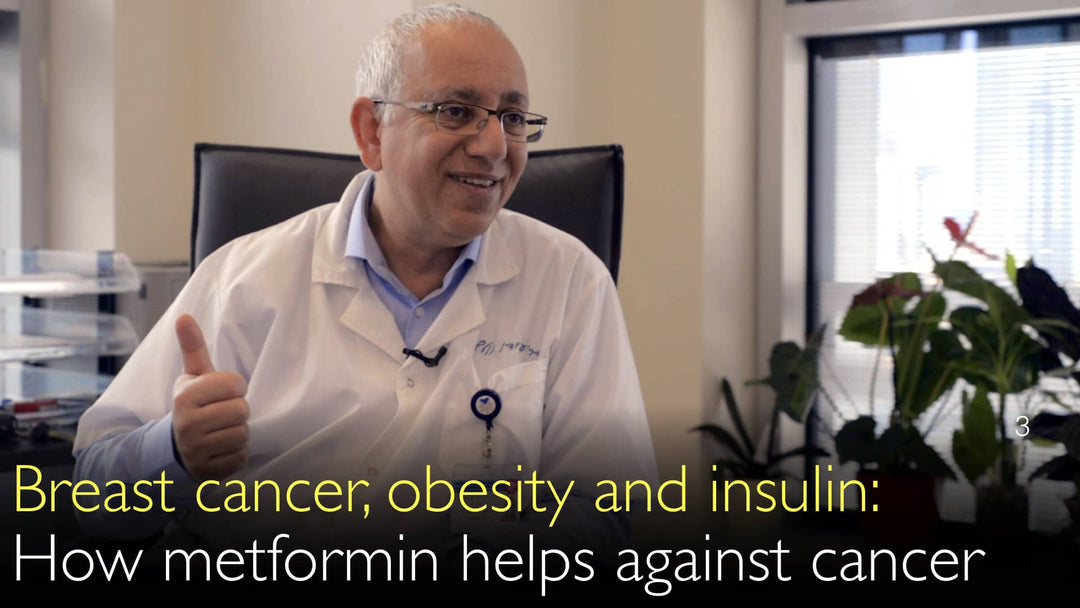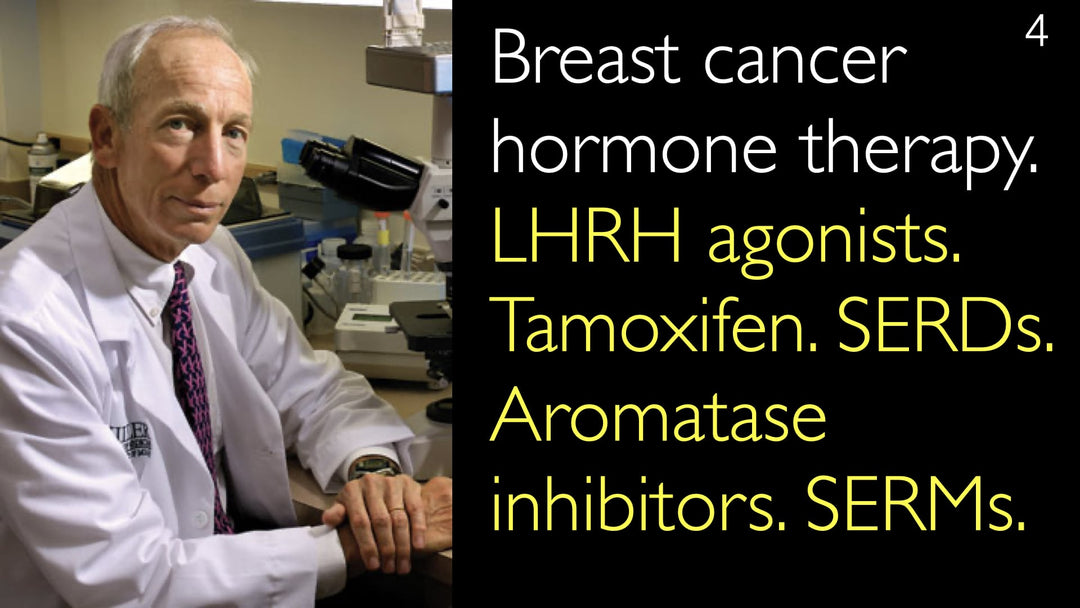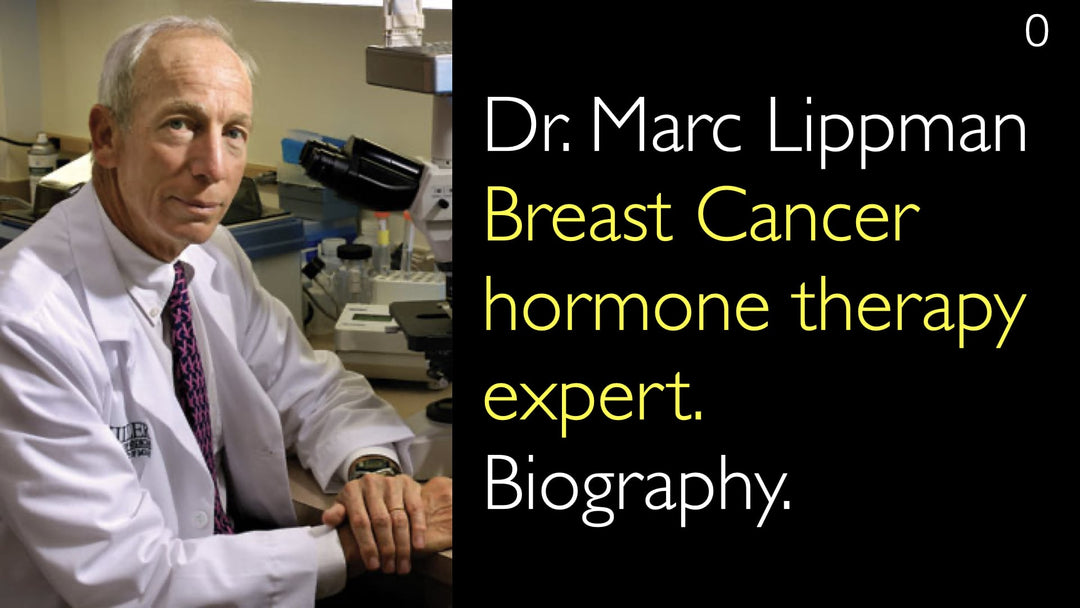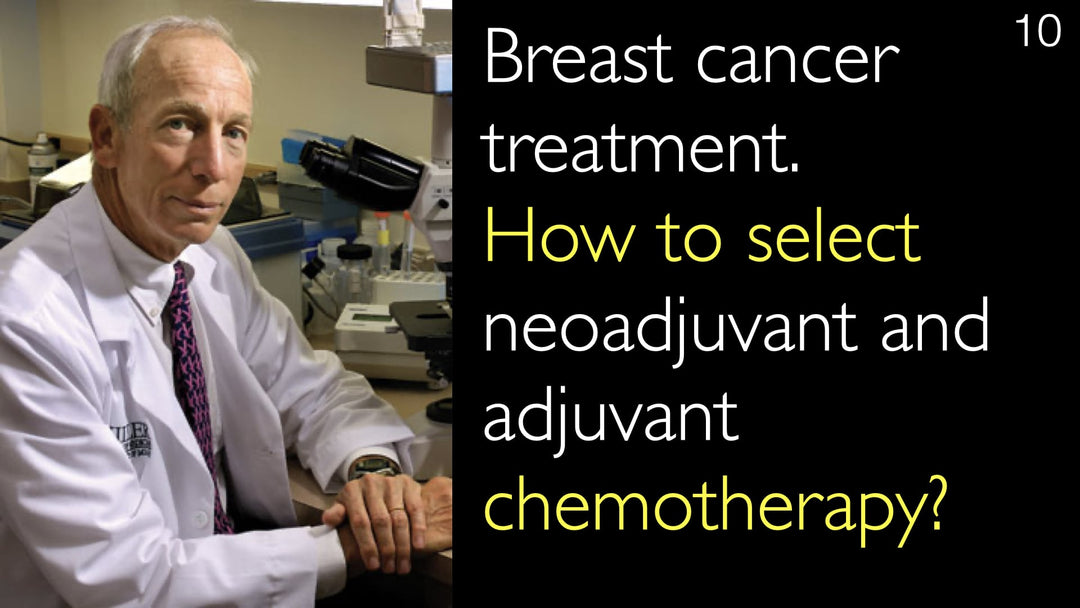Leading expert in breast cancer and metabolic pathways, Dr. Ido Wolf, MD, explains how obesity and diabetes increase cancer risk. He details the role of insulin and IGF-1 as potent growth factors for breast cancer cells. Dr. Ido Wolf, MD, discusses research showing metformin and GLP-1 agonists may inhibit cancer cell proliferation. He emphasizes that lifestyle prevention through weight management and physical activity remains the most effective strategy.
Understanding the Link Between Obesity, Insulin, and Breast Cancer Risk
Jump To Section
- Obesity and Diabetes as Breast Cancer Risk Factors
- Insulin and IGF-1 in Cancer Growth Mechanisms
- Metformin's Role in Cancer Prevention
- Safety of GLP-1 Agonists in Cancer Patients
- Lifestyle and Prevention Strategies
- Full Transcript
Obesity and Diabetes as Breast Cancer Risk Factors
Obesity is a major risk factor for breast cancer development, especially in Western populations. Dr. Ido Wolf, MD, explains that this connection is partly mediated through the development of type 2 diabetes. He notes that a sedentary lifestyle and excess body weight create a metabolic environment conducive to cancer. This environment is characterized by hormonal changes and increased levels of specific growth factors.
Dr. Wolf clarifies that while genetics and reproductive history are important, modifiable lifestyle factors like obesity are significant drivers of risk. The interview with Dr. Anton Titov, MD, highlights that the convergence of obesity, diabetes, and physical inactivity creates a perfect storm for oncogenesis.
Insulin and IGF-1 in Cancer Growth Mechanisms
Insulin and Insulin-like Growth Factor-1 (IGF-1) are potent drivers of breast cancer cell proliferation. Dr. Ido Wolf, MD, describes how insulin resistance in obesity and metabolic syndrome leads to hyperinsulinemia. High circulating insulin levels can activate signaling pathways that promote tumor growth and survival.
Similarly, IGF-1 is a closely related growth factor that stimulates cancer cell division. Dr. Wolf's research into the Klotho project focuses on understanding these specific activities of insulin and IGF-1 in cancer. Adipose tissue in obese individuals also secretes other hormones and reduces adiponectin, further influencing cancer risk.
Metformin's Role in Cancer Prevention
Metformin, a common diabetes medication, is associated with a reduced incidence of breast and prostate cancers. Dr. Ido Wolf, MD, discusses observational data showing diabetic patients on metformin develop fewer cancers. The drug's mechanism is multifactorial, involving direct effects on cancer cell metabolism and indirect effects on insulin levels.
Dr. Ido Wolf, MD, explains that metformin acts on mitochondria and activates AMPK (AMP-activated Kinase). This activation can inhibit the pro-cancer AKT/PI3 kinase pathway. By lowering insulin resistance, metformin also reduces the levels of circulating insulin, thereby removing a key growth signal for potential cancer cells.
Safety of GLP-1 Agonists in Cancer Patients
Research from Dr. Ido Wolf, MD's lab indicates that GLP-1 agonists are safe regarding cancer risk. There was initial concern that these diabetes drugs might promote cancer growth. However, Dr. Wolf's published work on Glucagon-like peptide-1 (GLP-1) shows these drugs actually inhibit the growth of cancer cells.
This finding is crucial for diabetic patients requiring medication. Dr. Anton Titov, MD, and Dr. Wolf confirm that commonly used GLP-1 agonists do not promote breast cancer cell proliferation. This provides reassurance about the safety profile of these important therapeutic agents.
Lifestyle and Prevention Strategies
The most effective strategy for reducing cancer risk is lifelong weight management and physical activity. Dr. Ido Wolf, MD, strongly emphasizes that prevention is superior to any medication. Maintaining an ideal body weight from a young age creates a metabolic state less favorable for cancer initiation and growth.
Regular exercise helps improve insulin sensitivity and reduces circulating growth factors. Dr. Wolf concludes that while medications like metformin show promise, they cannot replace the fundamental benefits of a healthy lifestyle. This approach benefits not only cancer prevention but also overall health and longevity.
Full Transcript
Breast cancer is influenced by hormones and growth factors. Insulin is a potent growth factor. Insulin levels increase in obesity because resistance to insulin by tissues rises in obesity and in metabolic syndrome. Metformin treatment resulted in fewer breast cancers in patients who were on metformin.
Dr. Anton Titov, MD: Leading cancer expert explains the link between insulin, glucose, breast cancer, and metformin treatment. Obesity is a risk factor for breast cancer. Obesity is also a risk factor for diabetes. There is a specific growth factor involved, Insulin-like Growth Factor-1, IGF-1. IGF-1 is something that you study as it relates to cancer.
How breast cancer is affected by obesity and diabetes? How to treat cancer with the knowledge about the role of IGF-1 receptor?
Dr. Ido Wolf, MD: There are many causes for breast cancer. Some of them are genetic, some of them are hormonal. For example, the number of pregnancies a woman had affects breast cancer risk. How many months the woman was breastfeeding also affects breast cancer risk. Those are hormonal aspects of breast cancer.
But we know now that obesity is one of the major risk factors for breast cancer. It is true especially in the Western world. How we live, the way of life affects cancer risks. We talked about two things. We talked about obesity, and we talked about less physical activity.
Together what we see is this. When we see more obesity, we also see more diabetes. We know that in order to prevent many cancers, we all must keep our ideal weight. We must do a lot of physical activity. This is sometimes difficult for many people.
There are many reasons for the connection between obesity, diabetes, lack of physical activity, and cancer. As you mentioned, we talked about the activity of insulin. Insulin activity is very high in diabetes. It probably drives breast cancer forward.
We talked about the IGF-1. This is Insulin Growth Factor One. This also drives the breast cancer. There are also many other hormones that are secreted from adipose tissue. They also play a part in cancer growth.
We started cancer-hormone link research as well. This is part of our endocrine research. It is also connected to another project in a lab. The Klotho project tries to address a specific activity of insulin and IGF-1 and cancer.
Dr. Anton Titov, MD: Let's talk about treatment of diabetes. We know that this is complicated.
Dr. Ido Wolf, MD: We know that insulin by itself may enhance the proliferation of cancer cells. Insulin is a necessary medication for many diabetic patients. On the other hand, metformin is also very commonly used medication. Metformin probably inhibits growth of cancer cells.
We published a paper about GLP-1, Glucagon-like peptide-1. There are many GLP-1 agonists that are being used. There was some fear the GLP-1 agonist may induce cancer. The good news that came from our lab is that GLP-1 inhibits growth of cancer cells.
That means that patients take GLP-1 agonists. Very commonly used GLP-1 agonists are probably quite safe. If we talk about breast cancer, GLP-1 agonists do not promote growth of breast cancer cells.
Dr. Anton Titov, MD: This is interesting! You mentioned metformin treatment of diabetes. This is a paper that you published. The fact that people who have diabetes and are treated with metformin. They have less propensity to develop cancers, including breast cancer. But not just breast cancer, also you mentioned prostate cancer. How could metformin potentially affect the cancer formation? Again, that refers to your work in IGF-1 receptors and insulin.
Dr. Ido Wolf, MD: This is a very complicated question because no one knows exactly a lot about the activity of metformin. We know that metformin acts on the mitochondria. We know that metformin alters the metabolism of cells. Probably metformin alters the metabolism of cancer cells in a preferential way.
That means metformin gives a metabolic advantage to non-cancer cells. Metformin gives a disadvantage to cancer cells. For example, metformin might activate AMPK, this is important enzyme within the cells. AMPK may inhibit some signaling pathways that are relatively important to cancer cells.
Metformin acts on the mitochondria, it activates AMPK [AMP-activated Kinase]. AMPK by itself inhibits the AKT/PI3 kinase pathway, for example. This is one putative mechanism how metformin works to prevent cancer. But we still have to learn more about activity of metformin.
Dr. Anton Titov, MD: That is interesting. Because also in Type 2 diabetes the sensitivity to insulin decreases. Therefore the pancreas pumps more and more insulin. The levels of insulin increase. Insulin drives the potential proliferation of cells, including cancer cells. Insulin activates cancer cells through the IGF-1 pathway. Metformin can affect that process and reduce the levels of insulin.
Dr. Ido Wolf, MD: Probably it is true. This is one of the major mechanisms how metformin works to reduce cancer. It is often multifactorial because very often Type 2 diabetes comes not only with high levels of insulin but also with high level of glucose. Some speculate that glucose has cancer-promoting activity by itself.
Also, high levels of insulin come with obesity. Obesity means reduced levels of adiponectin. Adiponectin also plays a role in cancer. Another thing is this. We know that in obesity there are higher levels of free estrogen that the body emits. Free estrogen is also called active estrogen. Free estrogen also plays a role in cancer formation and growth.
We talk about the multifactorial system, cancer, that cannot be probably cured by just one medication. Probably the best way is not to look at medications because we need to give many medications to treat cancer. The best thing is from young age try to be lean and physically active. Prevention is the best solution!
Prevention is the best solution. That is very important not only for cancer, but clearly for every disease!
Dr. Anton Titov, MD: Exactly!







